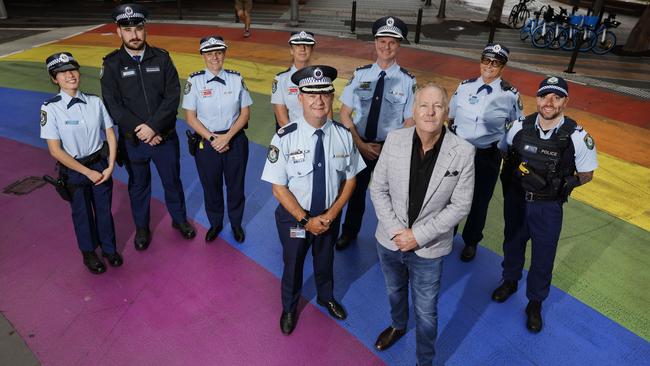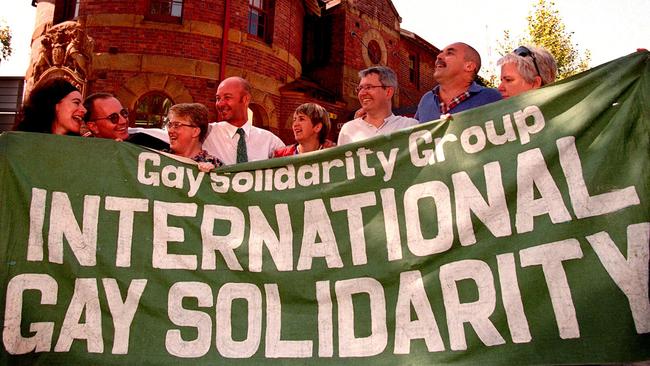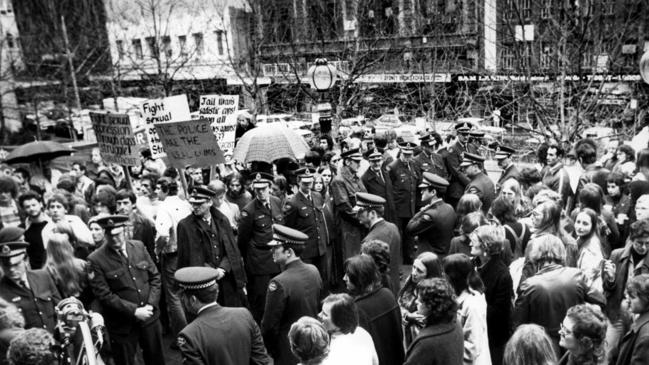NSW Police say still a way to go to mend ‘difficult’ relations with queer communities
With the annual Sydney Gay and Lesbian Mardi Gras festival underway, one of the state’s top police officers looks to the future while acknowledging a difficult past.
Confidential
Don't miss out on the headlines from Confidential. Followed categories will be added to My News.
One of NSW most senior police officers believes there is still a way to go to mend ‘difficult’ relations with LGBTQI+ communities.
With Mardi Gras festivities underway, NSW Assistant Police Commissioner Tony Cooke said: “We know that there is still difficulty but we continue to work on that. We have got a lot to do but we have achieved so much.”
The NSW Police treatment of queer people is a big focus of Qtopia Sydney, the largest centre for Queer history and culture in the world, that opens in the old Darlinghurst Police Station on Friday.

Mr Cooke, alongside former NSW Police Commissioner Mick Fuller, Prime Minister Anthony Albanese and NSW Premier Chris Minns are to attend.
The uniform worn by Mr Fuller at the time of his history making apology in 2018 to the original 1978 protesters features in the centre.
In his speech, he said: “When I was a 10-year-old boy sitting on a beanbag watching TV naive to all of it … now some 40 years later we have stories that make me sick. I can’t change that. But I can make you a promise we won’t make a backwards step, but I would much rather step forward in a partnership.”
Mr Fuller described the early protests and treatment of queer people by police as “a dark part of Sydney history”. The 1978 protest laid the foundations for Sydney’s annual Gay and Lesbian Mardi Gras.

“Putting aside the violence, taking away someone’s liberty is one of the strongest powers police have so merely for being in the street, having a voice, people were arrested and put in custody,” Mr Fuller said in an interview to feature in a Qtopia Sydney exhibit. “Law abiding citizens strip searched, detained, finger prints taken, and I think it is an ultimate betrayal when good people are dragged into that sort of situation. It is life changing. Those stories about the police going hands on and the police brutality were particularly sickening.”
In 1990, the LGBTIQ+ Liaison Officer Program was introduced into the police force with the aim of building trust with the community.
A report by Justice John Sackar into gay hate murders between 1970 and 2010 was highly critical of the approach taken by NSW Police and said an apology was warranted.
Current Commissioner Karen Webb in December said police actions at the time were “regrettable”. She marched alongside fellow police officers at last year’s Mardi Gras Parade.
Police marching in the parade is a contentious issue Mr Cooke and his colleagues understand.

“But it also demonstrates for us the diversity in our own police force,” he said. “Now that has changed significantly since 1978, let’s face it, that is the watermark for us all. Our police force is so much more diverse than it was back then and it is a big thing for our police to march in Mardi Gras to demonstrate that we are supportive of community and that many of our people are members of the community.”
Of Mr Fuller’s apology, Mr Cooke said acknowledging the wrongdoings of the past is important for the future.
“That really is about where we don’t want to go,” he said. “We are acknowledging that. Mr Fuller’s apology really did signal from the Commissioner the will and intent of the NSW Police Force to really move forward.”





